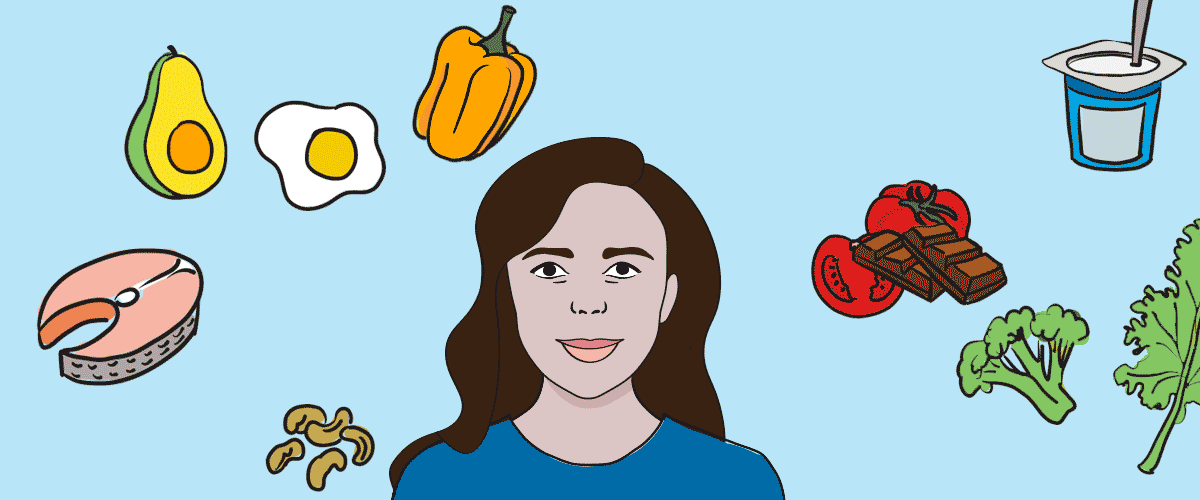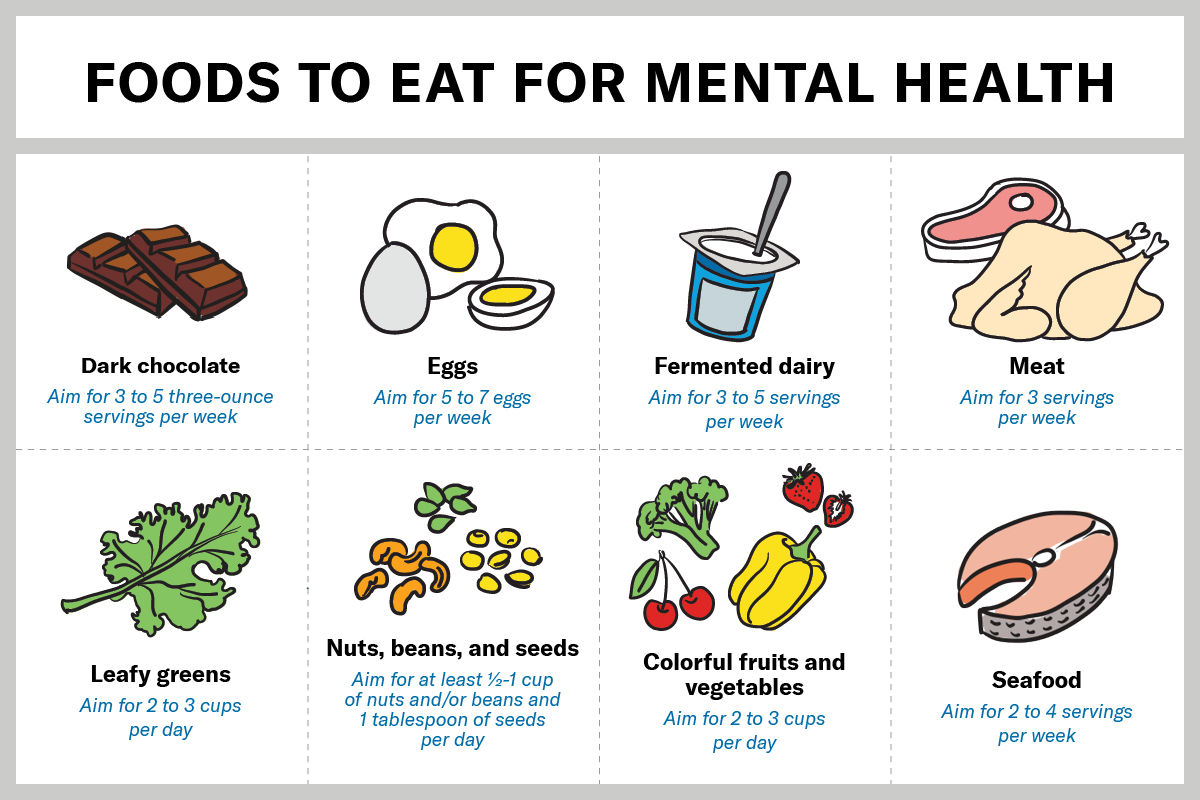Can What You Eat Affect Your Mental Health?
An expert in nutritional psychiatry explains the connection between food and mental health, and which foods support mental well-being.


While most people know that what you eat has a direct impact on your physical health, what is less widely understood is the connection between food and mental health.
“Your brain cells are the hungriest, thirstiest cells in your whole body,” says Dr. Drew Ramsey, an assistant clinical professor of psychiatry at Columbia University Vagelos College of Physicians and Surgeons. “The human brain needs certain nutrients to run well. And it’s definitely important to pay attention to the cells that generate human consciousness.”
In 2020, an estimated 21 million adults in the United States (8.4%) had at least one major depressive episode, according to the National Institute of Mental Health, and an estimated 31.1% of U.S. adults experience an anxiety disorder at some point in their lives.
“I certainly don’t want to imply in any way that when people have concerns with their mental health, it’s only because they don’t eat right,” says Dr. Ramsey. “But for many, nutrition is often a missing piece of a comprehensive mental health care and wellness plan. It’s empowering to know that there are choices we can make in our everyday lives to protect our mental health.”
Health Matters spoke with Dr. Ramsey to find out what to eat for mental health and learn more about the connection between our guts and minds.

Dr. Drew Ramsey
What is the link between food and mental health?
Dr. Ramsey: If we don’t eat the right foods, our physical health suffers, and the same goes for our mental health.
A healthy, nutrient-dense diet supports overall brain health, and research has suggested that nutrient-dense foods and a healthy dietary pattern can decrease the risk of depression. One study found that adolescents with low-quality diets are 79% more likely to suffer from depression, and another found that diets high in trans fats found in processed foods raised the risk of depression by 42% among adults over the course of six years.
A dietary pattern filled with processed foods leads to chronic inflammation, which can play a role in causing depression.
What is inflammation, and how does it influence depression and anxiety?
Inflammation is another word for activation of our body’s defense systems, which we depend on to eliminate disease. However, when those defenses are chronically triggered, it harms the body and over time can lead to heart disease, arthritis, Alzheimer’s disease, and potentially cancer. Lifestyle choices that promote inflammation — such as eating a diet high in sugar, trans fats, and processed food, which can alter the bacteria in the gut and interact with the immune system — cause the body’s alarm system to go off constantly. Inflammation can harm brain cells, and research has linked inflammation to mood disorders. A study in JAMA Psychiatry found significant brain inflammation in imaging scans for patients experiencing a major depressive episode.
How do the brain and gut interact?
The brain and gut communicate constantly through a powerful signaling highway called the gut-brain axis. Your gastrointestinal (GI) tract is home to neurons that can send messages to the nervous system within milliseconds. They can let your brain know you’re full, or that you ate something disagreeable, and much more.
The GI tract relies on the microbiome — trillions of microorganisms including bacteria, fungi, viruses, and other parasites that live in the GI tract — to help it transfer the right information to the brain. To stay healthy, you want a diverse microbiome, with a variety of good bugs called probiotics. Probiotics help break down foods, synthesize vital nutrients for the body, and provide nourishment for the cells in our gut. Studies have shown a strong correlation between a healthy microbiome and mental well-being.
What are some easy ways to start eating for mental health?
Like anything in life, when we are in a spot that is challenging, action matters. If you are depressed, you may not feel like going to the movies or cooking a meal. However, if you do those things, you may find that you feel a little bit more like yourself.
One of the most powerful mental health benefits of food is that it gives us an opportunity to be together and share something we all have in common. If you are feeling down, making a simple meal for someone can brighten their day and will probably make you feel better too. Few things feel as good as being generous and sharing.
A lifestyle that supports optimal brain health requires us to properly nourish ourselves, improve the quality of our sleep and movement, and deepen the quality of our connections. It may take time to change habits and feel the health benefits from these efforts, but it is worth it.
Dr. Ramsey encourages people to focus on nutrient-dense food categories and target the following categories to eat for mental health.

Dark Chocolate
Studies suggest eating dark chocolate can help reduce anxiety and improve symptoms of clinical depression. One study linked the cocoa flavonoids found in dark chocolate to improved memory and other health benefits. Flavonoids have anti-inflammatory properties and are a type of phytonutrient, powerful antioxidants found in plants, which help reduce cell damage.
Rather than grabbing a bag of chips on the go, choose snacks like dark chocolate and nuts, which pack more nutrients.
Aim for three to five 3-ounce servings per week.
Eggs
An incredibly nutrient-dense food, eggs contain protein, B vitamins, and choline, a nutrient involved in many different processes, including cell structure and messaging and nervous system maintenance.
Aim for five to seven eggs per week.
Fermented dairy
Yogurt and kefir are full of good bugs your body needs, as well as calcium and protein. Kefir is an exceptionally potent source of nutrients and probiotics. Try throwing kefir in your morning smoothie.
Aim for three to five servings of fermented dairy per week.
Leafy greens
Kale packs a punch, providing a tremendous amount of nutrition and phytonutrients. Spinach, watercress, arugula, collards, beet greens, and chard are other great options to help reach your daily dose of fiber; vitamins C and A, vital to the body’s healing process; and folate, which is necessary for making DNA, neurotransmitters, and the development of the nervous system.
Aim for two to three cups per day.
Meat
Even though plant-based diets provide many nutrients, meat is a good source of vitamin D, vitamin B12, omega-3 fats, and heme-iron (which increases the absorption of iron from vegetables). It’s best to choose grass-fed and pasture-raised beef and chicken, free of antibiotics and hormones.
Aim for three servings per week.
Nuts, beans, and seeds
Cashews, pumpkin seeds, and lentils are terrific sources of plant-based protein and are rich in essential vitamins. Research has linked frequent nut consumption with low inflammation. Nuts are a great snack and simple to add to foods, like a smoothie or salad.
Aim for at least ½ cup to 1 cup of nuts and or/beans per day and 1 tablespoon of seeds per day.
Rainbow fruits and vegetables
A colorful plate is a healthy plate. Tomatoes, avocados, bell peppers, broccoli, cauliflower, and berries provide phytonutrients to fight inflammation, and fiber to help the good bacteria in your gut thrive.
To help incorporate more healthy vegetables into your diet, try oven roasting them on a sheet pan with a little olive oil, salt, and pepper. Check out your local farmers market to see what produce calls out to you.
Aim for 2 to 3 cups per day.
Seafood
Seafood is full of nutrients, including fish oil, which contains omega-3 fatty acids with powerful anti-inflammatory properties. Oysters, clams, mussels, and scallops are particularly good for the brain since they contain nutrients for brain health like vitamin B12, and docosahexaenoic acid (DHA), an omega-3 fatty acid that reduces inflammation. Sardines, anchovies, salmon, and cod are also chock-full of brain-healthy nutrients like B12, iron, zinc, and protein. If you want to incorporate more seafood into your diet, test out a new wild salmon or cod recipe once a week.
Aim for two to four servings per week.
Try a recipe from Dr. Ramsey’s book, Eat to Beat Depression and Anxiety:
Honey Soy Wild Salmon Burger
Serves 4
Ingredients
2 large eggs
3 (5-ounce) cans wild salmon, drained
½ cup panko breadcrumbs
2 green onions
1 (1-inch) piece fresh ginger, peeled and grated
3 garlic cloves
Juice of 1 large lime (about 3 tablespoons)
2 tablespoons low-sodium soy sauce
1 tablespoon extra-virgin olive oil
For serving:
4 burger buns, sliced avocado, lettuce leaves, mayonnaise
Instructions
1. Whisk the eggs in a large bowl.
2. Add the salmon and use a fork to crush it up until no large chunks remain.
3. Add the panko, green onions, ginger, garlic, lime juice, and soy sauce and mix to combine.
4. Form four 1/2-inch-thick patties. Refrigerate if not cooking right away.
5. Warm the olive oil in a 12-inch skillet over medium-high heat. Cook the patties until golden brown all over, about 4 minutes per side.
6. To serve, spread mayonnaise all over the cut sides of the burger bun. Add a salmon patty to each bun, then top with avocado and lettuce. Place the top bun on top and serve.

